





Kapoten
Application instruction:
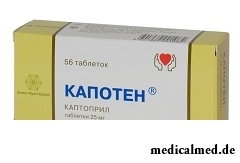 Kapoten – drug with hypotensive action.
Kapoten – drug with hypotensive action.
Form of release and structure
Kapoten release in the form of tablets: square with the rounded edges, from white with a cream shade till white color, biconvex with a crosswise notch on one of the parties, on another – with figure "452" and the squeezed-out word "SQUIBB", with a characteristic smell; the easy mramornost is admissible (in bottles on 40 pieces, on 1 bottle in a cardboard pack; in blisters on 10, 14, 15 pieces, on 1-4 blisters in a cardboard pack).
Is a part of 1 tablet:
- Active agent: captopril – 25 or 50 mg;
- Auxiliary components: microcrystallic cellulose, stearic acid, corn starch, lactose.
Indications to use
- Arterial hypertension, including renovascular;
- Dysfunctions of a left ventricle after the postponed myocardial infarction (at patients in clinically stable state);
- Chronic heart failure (along with other drugs);
- Diabetic nephropathy at patients with a diabetes mellitus of 1 type (at an albuminuria> 30 mg a day).
Contraindications
- The expressed functional disturbances of a liver and kidneys;
- Hyperpotassemia;
- Quincke's edema (hereditary or connected using inhibitors of an angiotensin-converting enzyme in the anamnesis);
- Stenosis of an artery of the only kidney with the progressing azotemia or a bilateral stenosis of renal arteries;
- States after transplantation of a kidney, a stenosis of the mouth of an aorta and other obstructive changes which complicate blood outflow;
- Pregnancy and period of a lactation;
- Hypersensitivity to drug components (now or in the anamnesis, including to other inhibitors of an angiotensin-converting enzyme).
Safety and efficiency of use of Kapoten for children are not studied.
Route of administration and dosage
Kapoten accept inside.
The mode of dosing is defined by indications.
At arterial hypertension the doctor selects Kapoten's dose individually. Drug needs to be accepted in a minimal effective dose.
The initial dose at easy and moderate degree of an idiopathic hypertensia makes 12,5 mg 2 times a day, supporting – 25 mg 2 times a day. If necessary each 2-4 weeks a dose can be increased. The usual effective therapeutic dose makes 50 mg 2 times a day.
The initial dose at a heavy hypertension makes 12,5 mg 2 times a day. Gradually daily dose is increased to maximum – 150 mg (3 times a day on 50 mg). At simultaneous use of Kapoten with other anti-hypertensive drugs the dose is recommended to be selected individually.
Treatment of heart failure needs to be begun under observation of the doctor. As a rule, the initial dose of 6,25 mg 3 times a day allows to weaken effect of tranzitorny hypotension as much as possible. The maintenance dose usually makes 25 mg 2-3 times a day. If necessary each 2 weeks increase a dose (as much as possible – 150 mg).
After the postponed myocardial infarction Kapoten's use can be begun already 3 days later. Drug 3 times a day with gradual (for several weeks) increase in a single dose up to 25 mg appoint in an initial dose 6,25 mg. In case of need, the dose can be increased gradually to maximum – 50 mg 3 times a day.
At development of symptomatic hypotension decrease in a dose can be required. According to indications it is possible to apply at the same time Kapoten with other medicines, for example, trombolitika, beta adrenoblockers and acetylsalicylic acid.
The recommended daily dose at a diabetic nephropathy makes 75-100 mg 2-3 times a day. The patient with achrestic diabetes with a microalbuminuria (at release of albumine of 30-300 mg a day) Kapoten appoint 50 mg 2 times a day. At the general clearance of protein drug it is necessary to accept more than 500 mg a day on 25 mg 3 times a day. If necessary perhaps simultaneous use with other anti-hypertensive drugs: beta adrenoblockers, diuretics, vazodilatator or drugs of the central action.
The daily dose of Kapoten at moderate or easy degree of a renal failure (at clearance of creatinine it is not less than 30 ml/min. / 1,73 of m ²) makes 75-100 mg 2-3 times a day. The initial daily dose at heavy renal failures (at clearance of creatinine it is less than 30 ml/min. / 1,73 of m ²) makes no more than 25 mg (on 12,5 mg 2 times a day). At insufficient efficiency of drug the dose is slowly increased by each 7-14 days before therapeutic effect, however it has to be below the maximum daily dose (due to decrease in a single dose or increase in an interval between administrations of drug). In case of need in addition it is necessary to apply loopback diuretics (not diuretics of thiazide type).
To elderly patients Kapoten's dose is selected individually. Therapy is recommended to be begun with the minimum therapeutic dose which should not be raised further.
Side effects
During Kapoten's use there can be side effects developing with various frequency:
- Nervous system and sense bodys: dizziness, headache, paresthesias, ataxy, vision disorders, drowsiness;
- Bodies of digestive tract: taste disturbance (has reversible character, passes independently), aphthous stomatitis, dryness in a mouth, increase in activity of enzymes of a liver; seldom – hepatitis, abdominal pains, a hyperplasia of gums, diarrhea, a hyperbilirubinemia, increase in level of hepatic transaminases in a blood plasma;
- Cardiovascular system and blood (hemostasis, hemopoiesis): tachycardia, orthostatic hypotension, peripheral hypostases;
- Respiratory system: bronchospasm, dry cough, fluid lungs;
- System of a hemopoiesis: in rare instances – an agranulocytosis, anemia, thrombocytopenia, a neutropenia (at patients with normal function of kidneys (at clearance of creatinine <1,6 mg/dl) in the absence of other complicating factors development of a neutropenia it was observed only in 0,02% cases); positive test for antibodies to nuclear antigen;
- Integuments: the rash (makulopapulezny, easy, passes within several days after decrease in a dose) which is followed usually by an itch and in rare instances increase in body temperature; rushes of blood to the person, violent and vesicular rashes, a photosensitization, an erythema (including Stephens-Johnson's syndrome);
- Water and electrolytic balance: a hyponatremia (most often develops at observance of an electrolyte-deficient diet with simultaneous use of diuretics), a hyperpotassemia (it is most probable at patients with a renal failure), a proteinuria, acidosis, the increased maintenance of an urea nitrogen in blood and creatinine;
- Allergic reactions: Quincke's disease of mucous membranes, extremities, lips, persons, language, throat or throat.
Special instructions
Before therapy, and also regularly in the course of Kapoten's reception it is necessary to control function of kidneys. At patients with chronic heart failure drug needs to be used under careful medical control.
Against the background of prolonged treatment increase in content of creatinine and urea in blood serum can be observed.
At patients with arterial hypertension at drug use the expressed arterial hypotension is observed only in some cases; the probability of development of this state increases at excessive loss of salts and liquid (for example, after an intensive care diuretics), at the patients who are on dialysis or at patients with heart failure.
The possibility of sharp lowering of arterial pressure can be minimized if in 4-7 days to cancel diuretics or previously (in 7 days) to increase intake of sodium of chloride. Also it can be reached appointment in an initiation of treatment of small doses of Kapoten (6,25-12,5 mg a day).
In the first 3 months of treatment it is necessary to control monthly number of leukocytes of blood, further – 1 time in 3 months. Patients with autoimmune diseases in the first 3 months of treatment need to control number of leukocytes every 14 days, then – each 2 months. At number of leukocytes less 4000/mkl performing the general blood test is shown, it is less 1000/mkl – therapy should be interrupted.
The risk of development of a hyperpotassemia at Kapoten's use is increased at patients with a renal failure and a diabetes mellitus, and also at patients who accept the potassium drugs, kaliysberegayushchy diuretics or other medicines leading to increase in potassium concentration in blood (for example, heparin). Simultaneous use of drugs of potassium and kaliysberegayushchy diuretics with Kapoten needs to be avoided.
When carrying out a hemodialysis it is recommended to avoid use of dialysis membranes with high-permeability (for example, AN69) that is connected with the increased risk of development of anaphylactoid reactions.
At development of a Quincke's disease it is necessary to cancel Kapoten and to make careful medical observation. In case of localization of hypostasis on a face, as a rule, special therapy do not carry out (for decrease in expressiveness of symptoms possibly purpose of antihistaminic drugs). At spread of hypostasis on language, a throat or a throat there is a threat of development of obstruction of respiratory tracts. In this case immediate introduction of 0,5 ml of 0,1% of solution of adrenaline (Epinephrinum) can be required.
Kapoten patients who keep to an electrolyte-deficient or low-salt diet as in this case the risk of development of arterial hypotension increases should take with caution.
At development after Kapoten's reception symptomatic arterial hypotension, the patient needs to accept horizontal position and to raise legs.
During therapy false positive reaction can be observed in the analysis of urine on acetone.
The patients accepting Kapoten should abstain from control of motor transport and performance of other potentially dangerous types of activity demanding the increased concentration of attention and bystry psychomotor reactions (because of probability of development of dizziness, especially after reception of an initial dose).
Medicinal interaction
At simultaneous use of Kapoten with some medicines there can be undesirable effects:
- Ganglioblokatora, diuretics, adrenoblockers: strengthening of hypotensive action of Kapoten;
- Kaliysberegayushchy diuretics (Spironolactonum, amiloride, Triamterenum) or potassium nutritional supplements: noticeable increase in potassium concentration in blood serum;
- Clonidine, indometacin and other non-steroidal anti-inflammatory drugs: decrease in anti-hypertensive action of Kapoten;
- Procaineamide, Allopyrinolum: development of a neutropenia and/or Stephens-Johnson's syndrome (the causal relationship is not found out);
- Immunodepressants (cyclophosphamide, Azathioprinum): increase in risk of development of hematologic disturbances;
- Probenetsid: decrease in release of captopril through kidneys;
- Lithium salts: increase in concentration of lithium in blood serum, at the same time increases risk of development of toxic and side effects of drugs of lithium.
Terms and storage conditions
To store in the place, dry, unavailable to children, at a temperature up to 25 °C.
Period of validity – 5 years.
Name of drug
Price
Drugstore
Kapoten тбл 25 mg No. 28 *, HFK (г.Москва) Quinacrine
152 rub.
 Network of the Moscow drugstores of IFC
Network of the Moscow drugstores of IFCKapoten тбл 25 mg No. 40 *, HFK (г.Москва) Quinacrine
208 rub.
 Network of the Moscow drugstores of IFC
Network of the Moscow drugstores of IFCKapoten тбл 25 mg No. 56 *, HFK (г.Москва) Quinacrine
279 rub.
 Network of the Moscow drugstores of IFC
Network of the Moscow drugstores of IFCExcept people, only one living being on the planet Earth – dogs suffers from prostatitis. Here really our most loyal friends.
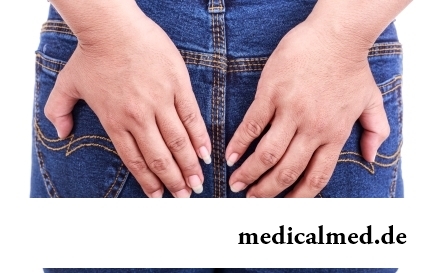
Hemorrhoids – extremely widespread disease. Periodically arising inflammations and bleeding of hemorrhoidal nodes пр...
Section: Articles about health
White teeth and the Hollywood smile – a dream of many people. Long time was considered that the plaque on teeth and change of their color – destiny of those who incorrectly eat smokes and badly brushes teeth. But the paradox is available: at everything the variety of toothpastes existing today...
Section: Articles about health
The phenomenon of improvement of a condition of the patients at administration of drugs who are not containing active agents, so-called effect of placebo is known long ago. At the end of the 18th century the American doctor Perkins began to treat people the "miracle" sticks made of alloy of steel and brass. Was for several minutes to press such subject enough to a sore point that it became much easier for the patient. Having suspected Perkins of charlatanism, his colleagues tried to repeat "miracle" by means of sticks, steles...
Section: Articles about health
More than a half of the married couples which faced prostatitis – leave. The new broadcast "Female View of Prostatitis" will help to learn...
Section: Articles about health
The majority of gynecologic diseases prove three main signs, each of which speaks about need of a visit to the gynecologist. Certainly, it is possible to establish the exact diagnosis only after inspection, but on the basis of some signs it is possible пр...
Section: Articles about health
Popular joke that there are no healthy people, and is nedoobsledovanny, most of us considers an honest truth, continually it is necessary to hear that all of us are sick hardly from a school bench. It is hard to say whether so it actually because too often people are treated for nonexistent diseases, and sometimes call a disease what is something another. Sometimes in it the doctors of old school making diagnoses which are cancelled long ago – medicine still unless are guilty...
Section: Articles about health
Tuberculosis – a serious infectious disease which development is caused by mycobacteria (Koch's bacilli). The illness is known from a deep d...
Section: Articles about health
Life expectancy in various regions of Earth is not identical. Social stability, economic wellbeing, availability and level of medical care, household comfort, literacy of the population in the field of observance sanitary гигиен exert impact on it...
Section: Articles about health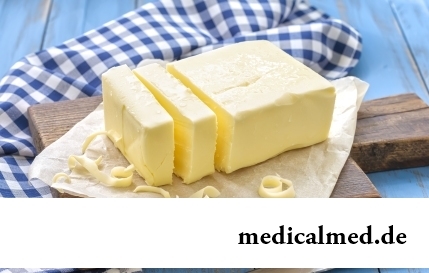
Within several decades of our compatriots convinced that the use of butter nasty affects a condition of coronary vessels. As a result the reputation of a product was impaired thoroughly a little, and many almost ceased to include it in the diet, having given preference "to safer" to vegetable fats. Meanwhile, the last researches showed that harm of butter for health is strongly exaggerated. But the product has a number of unique properties, to...
Section: Articles about health
The depression not without reason is considered one their main troubles of our century: for scientific and technical progress, acceleration of rate of life and a surplus...
Section: Articles about health
The advantage of swimming for the person is so high that this sport is not only the most popular, but also is widely applied in medicine and rehabilitation processes. If you look for for yourself the occupation allowing pleasantly and to spend time, then swimming with advantage...
Section: Slideshow
Smack in a mouth can arise in the natural way – as a result of lack of morning hygiene or reception of the corresponding food. However in certain cases its existence is a sign of certain pathologies, and allows to reveal an illness at an early stage. Depending on character of aftertaste – acid, salty, bitter, sweet – distinguish also diseases which accompany it....
Section: Articles about health
The sudden heat on all body which is followed by perspiration and a cardiopalmus – the phenomenon familiar to many people. Most often t...
Section: Articles about health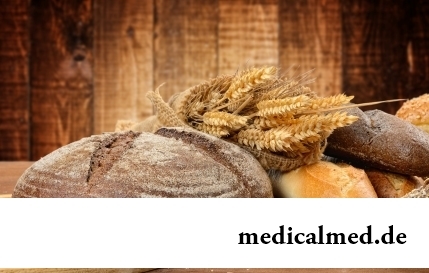
There is an opinion that at low temperatures safety of products is ensured longer and better thanks to what the refrigerator is considered the most suitable place for storage of food. In most cases it is fair, however there is a number of products, for a kotor...
Section: Articles about health
Neurosis is called pathology of a nervous system at which deviations in functioning of the highest nervous processes are observed. Most often - owing to yet not strengthened mentality - children are subject to neurosises. The unhealthy, hostile atmosphere in collective, a family, the strong and sharp shock, and also a set of other factors which negatively influence the little person who did not learn to overcome stresses yet can become premises to emergence of such disturbances....
Section: Articles about health
For anybody not a secret that our country is one of the most "drinking" in the world. At clear understanding of that the use of strong...
Section: Articles about health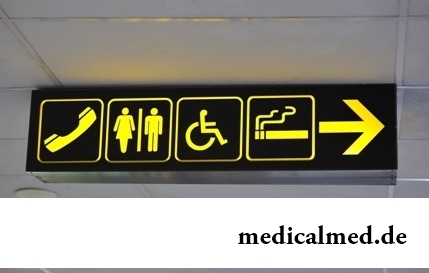
The saying "the rich do not know how the other half lives" is known to all. In a broad sense it is that we can not always understand the person whose features of a state are unknown to us. If with physiological characters of diseases the situation is more or less clearly (having noticed and...
Section: Articles about health
Impossibility to conceive the child – a trouble of many Russian families. During quite long time was considered that main "culprits" of troubles such are women. Modern physicians claim that the situation is different: about a half of failures in attempts of reproduction are connected with male infertility....
Section: Articles about health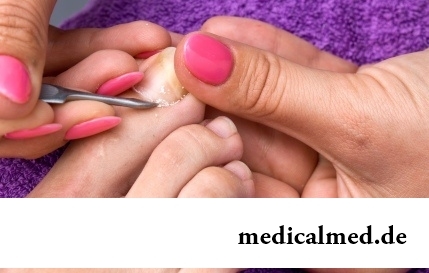
Beauty shop – the place which is associated only with positive emotions: joy, pleasure, relaxation. One...
Section: Articles about health
The phenomenon of the panic attack is known long ago, but the reasons of its emergence still are up to the end not found out. It is established that more than 30% of people at least once in life become the victims of very unpleasant phenomenon: without everyones on that the reasons they have a feeling of horror, with...
Section: Articles about health
Memory is an ability of the central nervous system to fix, keep and as necessary to reproduce information on knowledge or skills received by the person or an animal during life. The mechanism of this process is up to the end not studied....
Section: Articles about health
Mushrooms - the surprising inhabitants of our planet having a set of wonderful qualities. Thanks to one of them, a mold mushroom of Penici...
Section: Articles about health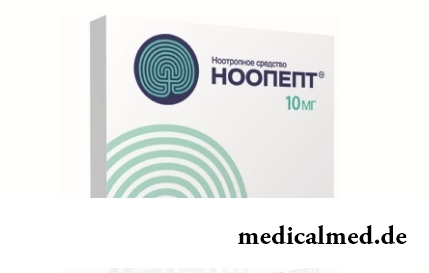
Many of us, probably, noticed more than once that from intellectual loadings at some point the brain as though "overheats" and "assimilation" of information is strongly slowed down. Especially this problem urgent for persons of age becomes more senior than fifty years. "It is already bad with...
Section: Articles about health
Is told about advantage of domestic animals for development of the child much. But many parents nevertheless do not hurry to bring pets as are afraid that they can do harm to health of children. What troubles can really trap kids and how to make joint life of a family and domestic animals comfortable and safe?...
Section: Articles about health
Use of medicinal plants in therapy is urgent today, more than ever. The drugs made of curative herbs cannot on...
Section: Articles about health
The next flu epidemic leads to the next panic, from year to year we give in on these manipulations: professionally alarming voice of the announcer in news, reports with calculation of the died patients, an interview with people in white dressing gowns and advertizing of anti-influenza means ра...
Section: Articles about health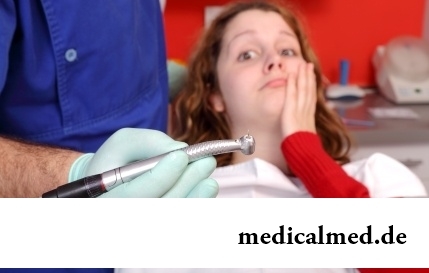
Statistically, can only one of ten of our compatriots brag of a decent condition of an oral cavity. Six teeth affected with caries are the share of the average Russian. For comparison, this indicator for Europeans is almost six times less....
Section: Articles about health

